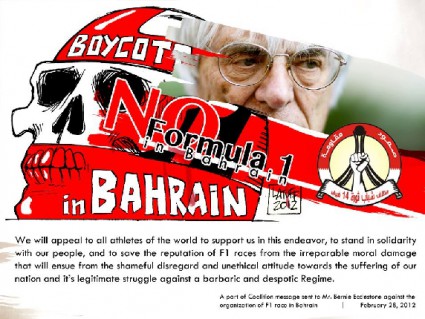Posts from — April 2012
Bahrain improving human rights one cracked head at a time
Bahrain: Crushing Pro-Democracy Protests. American and British Police Chiefs Step Up State Repression Top Western appointments allegedly aimed at improving human rights…
29 March, 2012 – by Finian Cunningham – Global Research
Two former police chiefs from the US and Britain have brought discernible Western “expertise” to the Bahraini force only weeks following their appointments – a surge in repression and state terrorism.
Former Miami police chief John Timoney and his British counterpart, John Yates, formerly commander at London’s Scotland Yard, were assigned last month by Bahrain’s royal rulers to “oversee reform” of the Persian Gulf kingdom’s security forces. Officially, the appointment of the American and Briton was to bring Western professional policing to the Bahraini force and specifically to upgrade the human rights record of Bahrain’s ministry of interior and National Security Agency.

Timoney left sips coffee while villages being attack with chemical gas
The assignments were announced by King Hamad Al Khalifa following a report by an international commission of inquiry into widespread human rights violations in the US-backed oil kingdom since pro-democracy protests erupted there last February.
As reported earlier by Global Research, the inquiry report and the subsequent appointment of the US and British police chiefs appeared to be a public relations exercise to burnish the tarnished image of this key Persian Gulf ally of Washington and London [1].
However, only weeks into their jobs, the Western commanders appear to have been given a remit that goes well beyond public relations, namely, to sharpen the repression against the pro-democracy movement.
Human rights activists and several political sources say that state forces have dramatically stepped up violence towards protesters and targeting of the Shia community generally. The diminutive island state of less than 600,000 nationals is comprised mainly of Shia muslims (70 per cent) who are ruled over by a Sunni elite installed by Britain when the kingdom gained nominal independence in 1971. American and British government support for the unelected Al Khalifa monarchy is viewed by the majority of Bahrainis as being at odds with their claims for democratic rights.
Over the past year, Bahraini state forces have killed some 50 people; thousands have been maimed, wounded and detained, many of the latter tortured. Proportionate to its population, such state violence is comparable to what Washington and London have loudly denounced the Libyan and Syrian regimes for – indeed mounting a military invasion of the former and threatening to do so in the latter – under the guise of “protecting human rights”. By contrast, there is hardly a word of denunciation from Washington or London towards the Bahraini regime, which hosts the US Navy’s Fifth Fleet. …more
April 3, 2012 No Comments
One size fits all talk of “Arab Spring” is an injustice
Bahrain’s uprising is more complex than the way it’s usually described.
Bahrain: One of Many Arab Springs
31 March, 2012 – Mitchell A. Belfer – M mathaba
The prevailing tendency to depict unrest in the Middle East as symptomatic of region-wide social and political injustice, exacerbated by suppression of dissent and a lack of democracy, is dangerously myopic. Using this template keeps observers from knowing the specific reasons for violent political demonstrations, by treating crowds as the rudderless, leaderless sum of their parts.
But crowds are not rudderless. They are governed — often by leaders who deliberately misremember the past in order to misconstrue the present, for better or worse — and those who govern them must be held accountable for their actions, especially when human life is sacrificed. So despite strong desires to forgive “unthinking crowds” for waves of destruction, especially when carried out for “progressive” reasons, individual accountability is key.
Too many political activists are allergic to self-reflection and tend to deflect calls for dialogue and moderation. They prey on the truth — manufacturing convenient politics with modern technologies and shrewd imaginations — to fulfill their own larger objectives. This has resulted in the proliferation of serial revolutionaries who upload decontextualized or manipulated pictures and videos to the Internet. Owing to the moral (and financial) austerity of many news agencies, such uploads are accepted, replayed with only scant warning that “independent verification” is impossible.
Within such a climate, how can accuracy be restored, and accountability applied, to balaclava-clad warriors who occupy the stern of revolutionary movements? The key is to deconstruct each crowd, reveal those individuals whose objectives are gaining power for themselves, and force them to practice democracy — not the democracy of votes, but of public accountability. Elections are just a part of democracy, dwarfed by bonds of social trust and a stable civil society. There can be no democracy without civil society, and civil society cannot exist in an atmosphere of political violence.
A criminalization of political violence must therefore be instituted, weighing each action on its merit so that assault is treated as assault, murder as murder, and arson as arson. In the Middle East, too many morally dubious actions are routinely categorized as legitimate political expressions, or suppressions, instead of crime. Whether committed by demonstrators or members of a state’s security forces, crime must be recognized as crime.
As these points become more widely grasped, broadly depicting Arab unrest as a “Spring” is becoming passé, and each demonstration has started to be viewed within its specific context. Members of crowds are finally being distinguished to see who is an honest demonstrator for economic and political reform, who is a radical, who is being manipulated by external actors, who is a criminal, and who a victim of circumstance.
Still, many in the media have not gotten the message. Misplaced shock accompanies reports that Libya’s Benghazi or Misurata crowds have been infiltrated by al-Qaeda, and that the Syrian opposition is actually a motley crew of radical ethno-religious movements. Few have publicly explored the segregation of men and women in Bahrain’s demonstrations, or the tribal nature of those in Yemen. Few have sought to identify the members of demonstrations to understand the essence of what is actually occurring. …more
April 3, 2012 No Comments
French Chemical Gas deployed against Bahrain portesters
Bahrainis protest against use of tear gas
29 March, 2012 – France 24
AFP – Hundreds of Bahrainis staged on Thursday a sit-in outside the offices of the United Nations demanding action over the “excessive” use by police of tear gas against protesters.
Protesters gathered outside the UN house in Manama, in a rally organised by the Shiite-led opposition, according to a statement by Al-Wefaq, the main opposition formation.
Police are regularly clashing with protesters who take to the streets in Shiite villages despite last year’s brutal crackdown on a month-long protest that demanded democratic change in the Sunni-ruled Gulf monarchy.
Protesters, including men and women, wore medical masks and carried used tear gas canisters of the type reportedly used by police to disperse demonstrations, according to pictures provided by the opposition.
Dozens of used tear gas canisters were also piled up by the protesters outside UN offices, the pictures showed.
Protesters chanted slogans demanding the international community to “take a stance against those crimes, and dangerous violations by Bahraini authorities against unarmed” people, said the statement.
Representatives of the opposition delivered a letter addressed to UN Secretary General Ban Ki-Moon demanding action.
“This excessive use (of tear gas) is a daily flagrant violation to the UN’s Basic Principles on the Use of Force and Firearms by Law Enforcement Officials,” the letter said.
The UN High Commissioner for Human Rights last week criticised Bahraini forces for their “disproportionate use of force” as they sought to quell protests, saying their use of tear gas may have led to over 30 deaths.
“We have been receiving worrying reports of the disproportionate use of force by Bahraini security forces, including the excessive use of tear gas, the use of birdshot pellets and rubber bullets,” said spokesman Rupert Colville. …source
April 3, 2012 No Comments
Support Bahrain Don’t Come to the F1
April 3, 2012 No Comments
The Revoltuion Since 14 February, 2011
April 3, 2012 No Comments
Whitewash is not reform! Dialogue is not necessary for regime about face!
Whitewashing the regime: Bahrain, press freedom paradise?
WAN IFRA – 2 April, 2012
Inspired by events in Tunisia and Egypt, the people of Bahrain took to the streets on 14 February, 2011 demanding change. More than a year after protests began on Pearl Roundabout, the epicentre of the Bahraini revolution, many argue that little has changed for the better. For the press, this sentiment is echoed most acutely.
A number of organisations have conducted missions and produced reports that investigate the state of freedom of expression in Bahrain, only to come up with one common result; things are getting worse. Journalists and human rights defenders have faced military trials, life imprisonment, torture, harassment, and in some cases even death whilst in the custody of the Bahraini authorities.
Despite this, Manama named itself the Capital of Arab Press for 2012 (it has been awarded the status of Capital of Arab Culture for 2012 by the Arab League as part of UNESCO’s cultural capitals programme), and recently hosted the Arab Youth Media Forum under the patronage of King Hamad Al-Khalifa. “This choice is the result of the freedom of the press enjoyed by Bahrain thanks to the reform project of His Majesty King Hamad bin Isa Al Khalifa as well as IAA attraction of Arab and international media institutions to operate from Bahrain,” said Information Affairs Authority President Shaikh Fawaz bin Mohammed Al Khalifa in an interview with the state-run Bahrain News Agency (BNA). Shaikh Fawaz also pointed out that “the King has asserted on many occasions that no journalist will be imprisoned nor will any newspaper or media establishment be closed,” adding that “approving a modern press and publication law reflects HM the King’s full support to Bahrain’s press.” The choice seems incongruous at best given the numerous attacks against independent journalists documented throughout 2011 – and that are reportedly still on-going.
Newspapers in Bahrain are mostly state-controlled, with the exception of Al-Wasat whose staff have certainly paid the price for being the only opposition newspaper. On 12 April 2011, Al-Wasat founder Karim Fakhrawi died after spending a week in police custody. Bahrain’s official news agency published on its Twitter page the news that Fakhrawi died of kidney failure, however photographs later emerged online showing the body identified as Fakhrawi’s covered in extensive cuts and bruises. Mansoor Al-Jamri was forced to resign from his position as Editor-in-Chief after being found guilty by a Manama court on 8 November 2011 of publishing false news and “harming Bahrain’s image” along with Managing Editor Walid Noueihed, Local News Director Aqeel Mirza, and Senior Editor Ali Al-Sherify. The four men each had to pay a fine of 1,000 dinars (US$2,650). …more
April 2, 2012 No Comments
One year on US complicity and support of Bahrain Regime takes country to brink of Civil War
April 2, 2012 No Comments
Bahrain F1, 2012 – Stop the Blood Money, Don’t Come!
April 2, 2012 No Comments
The whole monarchy of Bahrain, Saudi Arabia, GCC, if you don’t reform, listen to the demands of the people you will go away
April 2, 2012 No Comments
Human rights defender, Maryam AlKhawaja enters Egypt after being threatened with deportation
Human rights defender enters Egypt after being threatened with deportation
Viral Chopra – 2 April, 2012
Maryam Al-Khawaja, Bahraini human rights defender has been allowed to enter Egypt after being held at Cairo international airport for several hours on her arrival early Monday morning. She had travelled to Cairo from Copenhagen via Warsaw to attend a human rights conference but Egyptian border authorities told her she had been blacklisted and would be deported back to her country. News of Maryam Al-Khawaja’s detention quickly spread around via Twitter. A number of prominent Egyptian activists and her acquaintances tried to make a contact to help her. Another Palestinian Blogger and human rights defender Majed AbuSalama was also held at the airport at the same time as Maryam Al-Khawaja, but he was immediately deported back to Gaza.
Maryam Al-Khawaja comes from a Bahraini family known for its political activities. She is the daughter of human rights activist Abdulhadi Al-Khawaja, who is currently serving a life sentence in a Bahraini prison for his role in the country’s uprising, and sister to prominent blogger Zainab Al-Khawaja, better known as @angryarabiya. While there are counter statements that it was in fact a name mix-up at the border, Al-Khawaja was tweeting live @maryamalkhawaja and claiming that she was in fact denied access, and describing her treatment.
…more
April 2, 2012 No Comments
Day 55 of Abdulhadi al-Khawaja “freedom or death” hunger strike as Court schedules Appeal case for 23 April
Lawyers appeal sentence for Bahrain hunger striker
2 April, 2012 – Associated Press – AJC
MANAMA, Bahrain — Lawyers for a Bahraini human rights activist who is on hunger strike and attorneys for 20 other opposition figures appealed their convictions on anti-state charges on Monday.
Activist Abdulhadi al-Khawaja is serving a life sentence for his role in last year’s uprising in the Gulf kingdom. Seven other prominent opposition leaders were also sentenced to life imprisonment. Another 12 received lengthy prison sentences in a special security court, which was set up after the country imposed martial law last March to quell political unrest.
Al-Khawaja was arrested in April during a government crackdown on protests staged by the country’s Shiite majority demanding greater rights from Sunni rulers.
His lawyer Mohammed al-Jaishi said that he and the attorneys for the other 20 leaders appealed their clients’ convictions and sentences during Monday’s session in Bahrain’s Court of Cassation.
The attorneys also asked a five-judge panel to free the prisoners on bail — a request the judges declined, al-Jaishi said.
Another hearing in the case was set for April 23.
The 21 activists were convicted by a special security court in June of participating in efforts to overthrow the ruling dynasty. Of those, seven had been tried in absentia.
Al-Khawaja has been on hunger strike for more than 50 days. He has been refusing food since Feb. 8.
Last week, Amnesty International urged Bahrain to free him because of fears he could die. …more
April 2, 2012 No Comments
F1 fund State sponsored murder in Bahrain as protester gunned down in street by plain clothes operatives
Bahrain protests flare against F1 after protester dies
02 April, 2012 – The Telegraph
Ahmed Ismael Abdulsamad was shot in the right thigh on Saturday as he filmed a protest in the Shia village of Salmabad that plainclothes security forces tried to break up with tear gas and rubber bullets.
Opposition groups blamed “militiamen” accompanying security forces fired live bullets at the protesters from a civilian car, hitting Abdulsamad.
Dozens of young protesters gathered in the village of Abu Saiba, west of Manama, and Tubli, south of the capital, according to postings by the Coalition of the Youth of the February 14th Revolution on Facebook.
Police fired tear gas to disperse the small gatherings and made some arrests, according to provided footage.
Activists have intensified their campaign to push Formula One to cancel the Bahrain round of the world championship, slated for April 20-22 at the Sakhir circuit, southwest of Manama.
The race was cancelled last year due to the unrest that gripped the Shiite-majority state after a mid-March brutal crackdown on protests demanding democratic reforms that would challenge the power of the Sunni Al-Khalifa ruling dynasty.
“We (object to) holding a sports race that belittles the sacrifices of our children and ignores our suffering and wounds,” said a statement read by a youth dressed in a white death shroud and a black hood, according to a video posted online.
“Do not tarnish the reputation of the respected auto sport with the blood of Bahrain victims.”
On Twitter, a whole campaign has been launched against the return of the Grand Prix to Bahrain.
“Stop, my blood is flowing” and “race over blood,” were two slogans posted by activists on Twitter, where hashtags like BloodyF1 and NoF1 generate scores of tweets.
Formula One supremo Bernie Ecclestone has insisted that the outbreak of fresh violence will not affect this year’s grand prix.
Defending champion Sebastian Vettel and seven-time winner Michael Schumacher lately supported the return to Bahrain. …more
April 2, 2012 No Comments

































